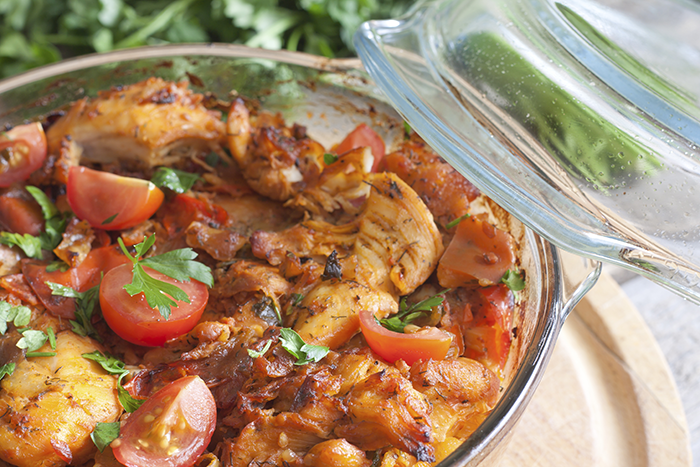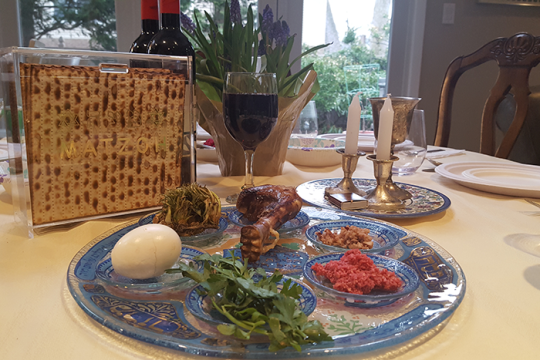
Nowadays, crockpots are ubiquitous in kitchens and wedding registries throughout North America. Many people have a favorite slow-cooked meal that transports them right back to their childhood. Slow cooking is nothing new. The Sephardi stew adefina dates back to the Spanish Inquisition, and cholent (another Shabbat stew) is thought to also have roots in Spain before making its way to Ashkenazi communities in the late 12th or early 13th century through Provence in France.
Cholent also served as the inspiration for the modern crockpot! When it was first introduced in the mid-1930s, the crockpot was called the "Naxson Beanery." The electric slow cooker was invented by Irving Naxson (who anglicized his name from Nachumsohn), who credited his mother's stories of making cholent in Lithuania with inspiring him to create his "beanery." His invention obtained its more well-known moniker, the crockpot, after Rival Manufacturing bought Naxon's company in the 1970s.
Whether you grew up with cholent (or one of its many variations) prepped in a crockpot or not, these hearty Shabbat stews make a perfect easy meal for busy home chefs. Check out these five slow-cooked stews, courtesy of Israeli food writer and culinary tour guide Joel Haber, the next time you find yourself in need of an easy meal for Shabbat or any weeknight!
- Polish Chulent
This is what many people think of when they think of a "classic" Ashkenazi cholent. The star of the show in this dish is the pieces of beef that are cooked in a slow cooker with barley, beans, and onions. You can find several ways to adapt and elevate this dish in the recipe notes!
- Persian Khalebibi
This Mizrachi stew comes from the city of Shiraz in southern Iran. Though beef and marrow serve as the main protein, the flavor of this stew really comes from the spices that give it a bit of a kick!
- Joel Haber's Hamin Kharshuf
This hearty stew was invented by Haber to highlight one of his favorite Israeli winter vegetables: the cardoon. If you can't find a cardoon at your local grocery store, you can use frozen artichoke bottoms (NOT hearts), which will give your stew a similar texture and taste!
- Vegetarian Hamin
This stew draws from Sephardi influences while avoiding meat altogether. While this recipe makes for a delicious stew all on its own, it can also be a great base for experimenting! Try adding your own twist to this recipe, just be sure that your additions will do well with long cook times.
- Indian Cochini Hamin
This chicken and rice stew originated with the Cochini Jews in Kerala, India. Several aromatic spices that were common on the trade route known as "the Spice Road" take center stage in this recipe, giving the end product a distinct, spicy profile.
Here are some of Haber's tips for making a great stew:
- There are many different ways to cook a stew. Even though these are all written for use with an electric slow cooker, you can also put the ingredients into a heavy pot (i.e. Dutch oven) and let it cook overnight in an oven set to 230 degrees Fahrenheit.
- Line the lid of your slow cooker with foil. This will help keep the stew moist. Make sure to wrap the foil around the edge of the lid to keep steam from dripping down the sides of your slow cooker. If your stew looks dry after a night of cooking, add some water.
- Make your stew your own! Omit any ingredients your family doesn't like and add ingredients you know you'll enjoy!
- When considering substitutions, think about whether the ingredients you want to add will hold up to slow cooking without becoming too mushy.
- Take into account whether you prefer a sweet or savory stew and make adjustments based on that.
- If you don't eat gluten, buckwheat and rice are great grains to use in your cholent.
- If you're vegetarian, you can either choose to omit the meat in a cholent recipe or substitute seitan, mushrooms, or plant-based sausages.
- Many cholent recipes call for dried beans that have been rehydrated, but canned beans also work just fine.
- Mix foods from different cultures! Put huevos haminados (Sephardi slow-cooked eggs) into an Askenazi cholent or include Yemenite jachnun into a Moroccan skhena.
- If you're cooking eggs in your stew, be careful when you take them out; they'll be very hot! Let them cool or briefly run them under cold water.
- Keep in mind that kosher meat is heavily salted. If you aren't using kosher meat, you may need to add more salt to the recipe.
If you'd like more inspiration and tips for slow-cooked Shabbat stews, visit Joel Haber's website to download his free e-cookbook!
Related Posts

The Sticky Stuff That Holds Us Together: Cheese

Judaism: The Faith of Feasting


